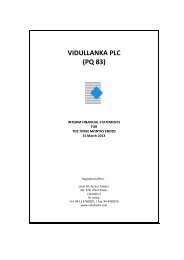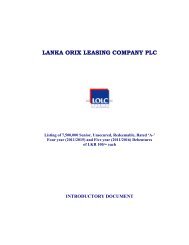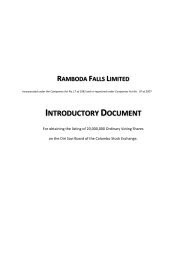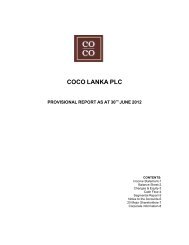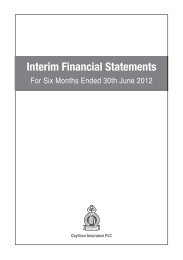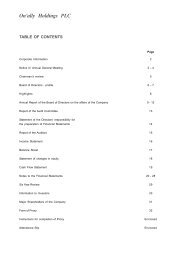Elpitiya Plantations Plc Annual Report 2010/11 - Colombo Stock ...
Elpitiya Plantations Plc Annual Report 2010/11 - Colombo Stock ...
Elpitiya Plantations Plc Annual Report 2010/11 - Colombo Stock ...
You also want an ePaper? Increase the reach of your titles
YUMPU automatically turns print PDFs into web optimized ePapers that Google loves.
Chairman’s Statement<br />
It gives me great pleasure to submit this report for the year ended<br />
March 20<strong>11</strong> where the highest net profit before management<br />
fees of Rs 386 mn was recorded, for <strong>Elpitiya</strong> <strong>Plantations</strong> <strong>Plc</strong> (EPP)<br />
for the year under review. Attractive prices for rubber and palm oil<br />
were the main contributors to this commendable performance.<br />
There were several other significant events that took place in EPP,<br />
all of which were responsible for improving the bottom line. The<br />
shareholders of the company subscribed to a rights issue, which<br />
helped to restructure the balance sheet resulting in a lower<br />
interest for the year compared to the previous year. We thank<br />
them for their support and confidence in the company. Further<br />
our efforts in diversifying the asset base contributed significantly<br />
to the operational results. The investment in palm oil both at field<br />
and factory level, and the diversification into hydropower<br />
contributed to sustaining the company’s profits by being a good<br />
balance to fluctuating commodity prices.<br />
The company is committed to protecting the environment and<br />
developing a sustainable model of plantation practices, covering<br />
both the field and the factories. Several initiatives have been<br />
undertaken at estate level to improve the condition of the soil, to<br />
contain water, and mitigate the effects of global warming. The<br />
gradual replacing of artificial fertilizer with organic fertilizer to<br />
minimise soil impact, and site specific fertilizing, providing only<br />
the required nutrients without excessive chemicals, are some of<br />
the other initiatives towards sustainability. Compost pits are<br />
maintained on the estates, with the long term goal of replacing<br />
one round of artificial fertilizer on estates with organic products.<br />
Further the company has a continuous forestry management<br />
programme to improve the biodiversity in the plantations and<br />
enhance the value of the environment. Currently over 700 ha of<br />
commercial forest has been planted by the company.<br />
Energy efficiency has also taken primary focus with several<br />
energy efficient initiatives being implemented covering the head<br />
office to the factories. These investments have given adequate<br />
results not only in terms of cost reductions but also in terms of<br />
lower energy use, thus making a contribution to reducing carbon<br />
emissions. Among the micro level efficiency improvements<br />
carried out are fuel switching and power factor correction systems<br />
and fibre reinforced plastic fan installation. A comparison of<br />
energy saving on the estates in the last 3 years shows a saving of<br />
approximately 1000 KVA units per month, which have been<br />
achieved with no production cutbacks or outsourcing of<br />
production. Energy savings have also been enabled through<br />
process redesign and efficiency improvements.<br />
Global warming and climate change will be a major risk that has<br />
to be addressed by the plantation industry and whilst we have<br />
taken a few steps to mitigate these effects, I believe that a clear<br />
consciousness and commitment to overcoming these effects<br />
must be addressed by all employees and stakeholders in the<br />
industry. Or else, all plantation crops in particular will be affected<br />
by its ill effects.<br />
We have also been in a position to develop five of our factories to<br />
obtain ISO 22000 underlying our commitment to quality, as well<br />
as customer commitment. Several other factories will also fall<br />
within this initiative in the next year.<br />
Despite the significant profits this year, the contribution from the<br />
tea sector particularly the up country estates were far below<br />
expectations. This was caused by a combination of events, i.e.<br />
inconsistent weather resulting in lower tea production and a tea<br />
market that was lower than the previous year. The low grown tea<br />
prices were somewhat better, although nowhere near the<br />
previous year levels. It was only in the month of March 20<strong>11</strong> that<br />
both tea production and prices improved culminating in the<br />
company being able to reduce the losses on tea before the close<br />
of the financial year. It was fortunate that profits from rubber, palm<br />
oil and hydropower compensated to the poor performance from<br />
the tea sector.<br />
The future for EPP is very challenging. On one side, with the<br />
government’s thrust and priority towards plantations and<br />
agriculture, the estates show great promise for diversification into<br />
other crops and industries. On the other hand, the industry is<br />
faced with twin problems of rising cost and lower productivity<br />
particularly for high and mid grown tea. This has been an area of<br />
concern for the past several years as Sri Lanka’s competitiveness<br />
as a tea producer has declined with each successive wage<br />
increase and it is unfortunate that there does not appear to be a<br />
visible solution in sight to resolve this issue. All stakeholders must<br />
realize that unless each stakeholder acts with responsibility and<br />
<strong>Elpitiya</strong> <strong>Plantations</strong> <strong>Plc</strong> <strong>Annual</strong> <strong>Report</strong> <strong>2010</strong>/<strong>11</strong><br />
3






